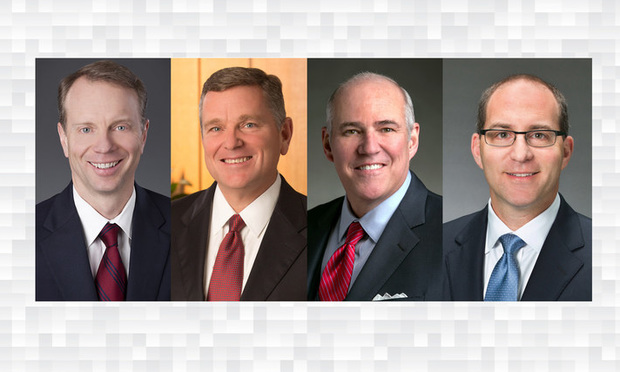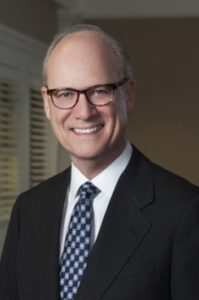Think Big Law Is Your Ticket to Success? These 4 Big-Company GCs Came From a Midsize Firm in Texas
The general counsel of General Motors, Chevron Phillips Chemical, LyondellBasell Industries, and American Air Liquide Holdings all once worked at the now-shuttered litigation boutique Beirne, Maynard & Parsons.
October 11, 2018 at 03:26 PM
6 minute read
 (L-to-R): Kevin Feeney, GC at American Air Liquide Holdings; Timothy Hill, GC at Chevron Phillips Chemical; Craig Glidden, GC at General Motors; and Jeffrey Kaplan, GC at LyondellBasell Industries.
(L-to-R): Kevin Feeney, GC at American Air Liquide Holdings; Timothy Hill, GC at Chevron Phillips Chemical; Craig Glidden, GC at General Motors; and Jeffrey Kaplan, GC at LyondellBasell Industries.
It is common knowledge that many of corporate America's general counsel start out as associates in Big Law. But for at least four prominent GCs, including the chief legal officer of General Motors, that's not the case: They all cut their legal teeth at Beirne, Maynard & Parsons, a midsized litigation boutique that closed in 2016.
The training they received at the firm, which was innovative for its time, helped prepare them for their jobs as top lawyers in corporate America, they say.
“We also were early disrupters in the sense that we knew that we had to do things differently to get the kind of work that we knew the firm deserved and wanted,” said Craig Glidden, now executive vice president and general counsel of General Motors Corp. “So, we embraced some new ways of doing things.”
In addition to Glidden, Timothy Hill of Chevron Phillips Chemical, Jeffrey Kaplan of LyondellBasell Industries, and Kevin Feeney of American Air Liquide Holdings all did stints at Beirne Maynard.
The Houston-based firm was a good incubator not only for a courtroom practice but also for the business management side of the law, the GCs said. It had an entrepreneurial culture and placed emphasis on understanding business at a time when many firms were unconcerned about that part of the equation. Beirne Maynard was an early adapter of cap-based billing, budgeting and predicting legal costs, for example.
“We did it because we were trying to get clients,” Glidden said.
Glidden and the others say that much of what they learned on the job during those early, fast-paced days of their career in the late 1980s and early 1990s in Houston applies to the legal departments they now run. Glidden cites alternative billing and case management as two important areas.
“It was just the founders of the firm—Marty Beirne, Bill Maynard, and Jeff Parsons. They were great lawyers, great teachers and really stressed the importance of understanding the underlying business part of your clients' cases, said Kaplan, executive vice president and chief legal officer at LyondellBasell Industries. “They were very supportive of their lawyers getting really to the root of the business issues.”
In addition to the four GCs who emerged from Beirne Maynard, a number of its other lawyers now have high-ranking in-house jobs.
Beirne Maynard opened its doors in 1987 as a trial boutique but closed in 2016 when 30 trial lawyers from four offices joined Florida's Akerman and 10 others left to form the litigation boutique Parsons McEntire McCleary in Houston.
 Martin Beirne
Martin BeirneMartin Beirne, now a senior partner at Akerman, said Beirne Maynard's business model required the lawyers to understand their clients' business.
“You had to know what made the company tick. The more you understood about the company, the better you'd know how to put the case together,” Beirne said.
The firm in its early days also did a lot of experimentation with fixed-fee billing, cap-based billing, and even used task-based billing codes well before most clients were using it, he said. Beirne Maynard accumulated task-based billing data that helped lawyers size up what it would cost to handle a lawsuit, and the lawyers became adept at providing clients with budgets.
“We were trying to experiment. We were a young firm,” Beirne said.
All four of the lawyers who are now big-company GCs overlapped at Beirne Maynard. In fact, Glidden was the hiring partner who recruited Kaplan, Feeney and Hill.
Feeney was an associate in 1995 when he left to go in-house at American Air Liquide. He held several in-house positions at the company before assuming his current GC role. Glidden, Hill, and Kaplan left Beirne Maynard in 1996 to form a small litigation shop known as Glidden Partners.
At that firm, Glidden said they expanded on many of the innovations they had learned at Beirne Maynard, such as project management and alternative billing.
In 2000, Glidden left his firm and took the GC job at Chevron Phillips, which was formed that year with the merger of the chemical operations of Chevron Corp. and Phillips Petroleum Co. In that job, he said he was able to build a legal department from the ground up and adopt some progressive approaches, including lean staffing, applying project management to legal work, and using technology to support it. By 2001, Glidden had recruited both Hill and Kaplan to his in-house department.
Hill said that as he transitioned from a litigation practice to an in-house role, his practice evolved into more proactive work on the front end, such as safety issues, which are a big focus in the chemical industry. He moved into the GC job at Chevron Phillips after Glidden left in 2009 to become GC at LyondellBasell.
Hill, who has an undergraduate degree in finance, said he thought while in law school that he would do commercial law. But he said he joined Beirne Maynard because of its entrepreneurial mindset and the fact that the firm embraced innovative concepts. He said that made the transition to in-house work easier for him, as he was able to focus on the business aspects of practicing law that he learned at Beirne Maynard and later at Glidden Partners.
“I was more on the front end of being able to explain it to clients,” he said. “The legal system—it doesn't have to be a black box.”
Kaplan stayed at Chevron Phillips Chemical until 2009, when he joined Glidden once again—this time at LyondellBasell. He moved into the top job there after Glidden moved to GM in 2015.
Feeney said a background as a litigator is valuable to the GC role because trial lawyers learn how to be calm in a crisis, speak well, and learn how to take a complex issue and talk about it to businesspeople. He said his initial role at American Air Liquide was to manage litigation, but over time he did more transactional work before becoming the company's GC.
Glidden said that the work he and the other GCs did back when they were commercial litigators was intended to differentiate the firm to clients. But now, he said, he uses all of those tools to manage legal departments and coordinate outside counsel.
RELATED STORIES:
Akerman Expands in Four Cities as Houston's Beirne Maynard Shuts Its Doors
GC Oversees Legal Matters for Air Liquide SA's Eight Operating U.S. Subsidiaries
This content has been archived. It is available through our partners, LexisNexis® and Bloomberg Law.
To view this content, please continue to their sites.
Not a Lexis Subscriber?
Subscribe Now
Not a Bloomberg Law Subscriber?
Subscribe Now
NOT FOR REPRINT
© 2025 ALM Global, LLC, All Rights Reserved. Request academic re-use from www.copyright.com. All other uses, submit a request to [email protected]. For more information visit Asset & Logo Licensing.
You Might Like
View All


Seyfarth Launches Energy Transactions Practice in Houston With Polsinelli Team
3 minute read
Trending Stories
- 1Miami Attorneys Secure $4M Settlement Despite Insurance Limits
- 2NY Judge Admonished Over Contributions to Progressive Political Causes
- 3Legaltech Rundown: Alexi Launches an AI Litigation Tool, Hotshot Announces Private Equity Practice Courses, and More
- 46-48. It’s Comp Time Again: How To Crush Your Comp Memo
- 5'Religious Discrimination'?: 4th Circuit Revives Challenge to Employer Vaccine Mandate
Who Got The Work
Michael G. Bongiorno, Andrew Scott Dulberg and Elizabeth E. Driscoll from Wilmer Cutler Pickering Hale and Dorr have stepped in to represent Symbotic Inc., an A.I.-enabled technology platform that focuses on increasing supply chain efficiency, and other defendants in a pending shareholder derivative lawsuit. The case, filed Oct. 2 in Massachusetts District Court by the Brown Law Firm on behalf of Stephen Austen, accuses certain officers and directors of misleading investors in regard to Symbotic's potential for margin growth by failing to disclose that the company was not equipped to timely deploy its systems or manage expenses through project delays. The case, assigned to U.S. District Judge Nathaniel M. Gorton, is 1:24-cv-12522, Austen v. Cohen et al.
Who Got The Work
Edmund Polubinski and Marie Killmond of Davis Polk & Wardwell have entered appearances for data platform software development company MongoDB and other defendants in a pending shareholder derivative lawsuit. The action, filed Oct. 7 in New York Southern District Court by the Brown Law Firm, accuses the company's directors and/or officers of falsely expressing confidence in the company’s restructuring of its sales incentive plan and downplaying the severity of decreases in its upfront commitments. The case is 1:24-cv-07594, Roy v. Ittycheria et al.
Who Got The Work
Amy O. Bruchs and Kurt F. Ellison of Michael Best & Friedrich have entered appearances for Epic Systems Corp. in a pending employment discrimination lawsuit. The suit was filed Sept. 7 in Wisconsin Western District Court by Levine Eisberner LLC and Siri & Glimstad on behalf of a project manager who claims that he was wrongfully terminated after applying for a religious exemption to the defendant's COVID-19 vaccine mandate. The case, assigned to U.S. Magistrate Judge Anita Marie Boor, is 3:24-cv-00630, Secker, Nathan v. Epic Systems Corporation.
Who Got The Work
David X. Sullivan, Thomas J. Finn and Gregory A. Hall from McCarter & English have entered appearances for Sunrun Installation Services in a pending civil rights lawsuit. The complaint was filed Sept. 4 in Connecticut District Court by attorney Robert M. Berke on behalf of former employee George Edward Steins, who was arrested and charged with employing an unregistered home improvement salesperson. The complaint alleges that had Sunrun informed the Connecticut Department of Consumer Protection that the plaintiff's employment had ended in 2017 and that he no longer held Sunrun's home improvement contractor license, he would not have been hit with charges, which were dismissed in May 2024. The case, assigned to U.S. District Judge Jeffrey A. Meyer, is 3:24-cv-01423, Steins v. Sunrun, Inc. et al.
Who Got The Work
Greenberg Traurig shareholder Joshua L. Raskin has entered an appearance for boohoo.com UK Ltd. in a pending patent infringement lawsuit. The suit, filed Sept. 3 in Texas Eastern District Court by Rozier Hardt McDonough on behalf of Alto Dynamics, asserts five patents related to an online shopping platform. The case, assigned to U.S. District Judge Rodney Gilstrap, is 2:24-cv-00719, Alto Dynamics, LLC v. boohoo.com UK Limited.
Featured Firms
Law Offices of Gary Martin Hays & Associates, P.C.
(470) 294-1674
Law Offices of Mark E. Salomone
(857) 444-6468
Smith & Hassler
(713) 739-1250






